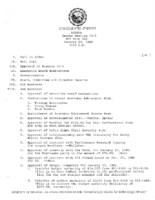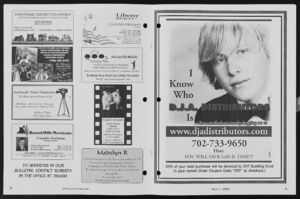Search the Special Collections and Archives Portal
Search Results

Transcript of interview with Sonja Saltman by Barbara Tabach, August 18, 2015
Date
Archival Collection
Description
Included in this oral history are reminiscences of Sonja Saltman's personal non-Jewish heritage in Austria, the importance of her grandmother in her life, and how she recalls becoming part of the Jewish community.
Sonja Saltman is a psychologist and philanthropist in Las Vegas, Nevada. She is executive director and co-founder of the Existential Humanistic Institute, a non-profit organization based in San Francisco, California that offers training in existential-humanistic therapy and theory. In 2003 Sonja and her husband Michael Saltman founded the Saltman Center for Conflict Resolution at the University of Nevada, Las Vegas (UNLV) William S. Boyd School of Law. The Saltman Center is focused on research, teaching, and public service related to "the advanced study of the nature of conflict and how to resolve it." A native of Austria, Sonja Saltman also serves as the Honorary Consul for Austria in Las Vegas. The Saltmans are involved with multiple charitable organizations and initiatives, both locally and abroad. Sonja Saltman has served on the boards of the Anti-Defamation League, Nevada Women's Philanthropy, and the Black Mountain Institute. Projects that the couple has supported include the rebuilding of homes and bridges is Bosnia, and Streetball Hafla, a basketball program to improve relations between Jewish and Arab teenagers in Israel. In 2014 Sonja and Michael Saltman were recognized as Distinguished Nevadans by the Nevada System of Higher Education. Included in this oral history are reminiscences of her personal non-Jewish heritage in Austrian, the importance of her grandmother in her life, and how she recalls becoming part of the Jewish community.
Text

Transcript of interview with Dr. John Shepherd by Lisa Gioia-Acres, November 21, 2008
Date
Archival Collection
Description
Dr. John Richard Shepherd shares the background of his early life in southern Illinois, his father's and grandfather's occupations, and his educational journey through college and medical school. His army experiences in Chicago and Alabama convinced him and his wife to look for a warm dry climate in which to live, and they relocated to Las Vegas in 1968. Dr. Shepherd recalls the businesses and housing surrounding Sunrise Hospital, the difficulties getting his specialty listed in the phone book, and renting his first office space from Nate Adelson. He also describes taking out a loan to install ophthalmology equipment, hiring an office manager with medical accounting experience, and doing cataract surgery in a way that basically hadn't changed for decades. The passing of the Medicare bill back in 1966 caused Dr. Shepherd's practice to build up quickly. He details the many ways eye surgery changed, including the invention of the intraocular lens and the phacoemulsification procedure. He mentions his and Dr. Shearing's contributions to ophthalmology — better designed lenses and surgical techniques - which they taught to other doctors from all over the country. Dr. Shepherd discusses radial keratotomy, which was a precursor to laser and later LASIK surgery, and describes a lens implant technique he learned in Russia from Dr. Fyodorov. He goes on to share anecdotes and stories of his interactions with patients, his travels as a consultant and as a surgical teacher for Project Orbis, and meeting Fidel Castro. He speaks candidly about his successes and his failures as well. Dr. Shepherd retired in 2006 and immediately enrolled in a Master's program and earned a degree in military history. After a long and distinguished career, after receiving many accolades and awards, he and his wife are enjoying life, splitting their time between Sun Valley, Idaho, and Las Vegas.
Text

Meeting minutes for Consolidated Student Senate University of Nevada, Las Vegas, January 23, 1986
Date
Archival Collection
Description
Text
Charles P. Squires Photograph Collection
Identifier
Abstract
The Squires Family Photographs document the Squires Family and the development of the Las Vegas Valley in Nevada from approximately 1860 to 1980, with a bulk of the photographs depicting people and events from 1900 to 1950. The photographs depict the Euro-American settlement and growth of Las Vegas, Nevada; traveling and exploration of Southern Nevada and the Southwestern United States; the Hoover (Boulder) Dam and the Colorado River; clubs and social groups; and the Squires Family, especially prominent newspaper editor and publisher Charles Pember (C. P. or “Pop”) Squires, Delphine “Mom” Anderson Squires, and their children.
Archival Collection
UNLV Libraries Collection of GTECH Corporation Press Materials and Financial Reports
Identifier
Abstract
The UNLV Libraries Collection of GTECH Corporation Press Materials and Financial Reports includes annual reports, financial reports, equity research reports, prospectus, press kits, press releases, promotional materials, international lottery advertisements, and lottery industry publications produced by GTECH Corporation located in West Greenwich, Rhode Island, dating from 1987 to 2002.
Archival Collection
Harry Hayden Whiteley Architectural Records
Identifier
Abstract
The Harry Hayden Whiteley Architectural Records are comprised of architectural records (1931-1970) created and/or maintained by the American architect Harry Hayden Whiteley and/or his architectural firm, known as Harry Hayden Whiteley and Associates. This collection includes 30.21 linear feet of materials including 45 items from over 30 projects. The collection focuses on his work in the Las Vegas and Reno, Nevada areas. The materials feature both architectural drawings and project files. Architectural drawings include pencil and ink on tracing paper preliminary sketches and mounted artist’s renderings used for presentations and promotional materials. Project files include project correspondence, photographs, and structural calculations. The drawings also contain work from the architect Paul Revere Williams. The collection includes architectural drawings for hotels, shopping plazas, residential developments, and office buildings.
Archival Collection
Bill Hughes Photographs
Identifier
Abstract
The Bill Hughes Photographs (approximately 1980-2012) contains negatives, slides, prints, proofs, and born digital images created by local photographer and photojournalist Bill Hughes for publications including Las Vegas CityLife, Las Vegas Business Press, Las Vegas Weekly, as well as commercial clients. A portion of prints in the collection consist of modeling photographs Hughes took as part of his business. The digital images represent a variety of clients, and feature local bands, DJs, and performers in nightclubs and bars on the Strip and downtown Las Vegas. Also included in digital files are portraits, artistic photographs and self-portraits, and material used for Las Vegas Weekly, CityLife, and Business Press.
Archival Collection
American Red Cross Southern Nevada Chapter Records
Identifier
Abstract
The American Red Cross Southern Nevada Chapter Records (1917-2015) include business records, legal and property documents, scrapbooks, photographs, awards and event programs. Also included is documentation of training events in Southern Nevada and disaster relief efforts throughout the country.
Archival Collection
Las Vegas, Nevada Strip Hotel Labor Relations Collection
Identifier
Abstract
The Las Vegas, Nevada Strip Hotel Labor Relations Collection comprises legal documents, correspondence, and human resources manuals and pamphlets related to labor in the hospitality industry on the Las Vegas Strip in Nevada from 1963 to 2008. The majority of documents involve the Culinary Union, the Bartenders Union, the Teamsters Union, MGM Mirage affiliated hotel casinos, the Dunes Hotel, and the Sands Hotel and Casino.
Archival Collection

